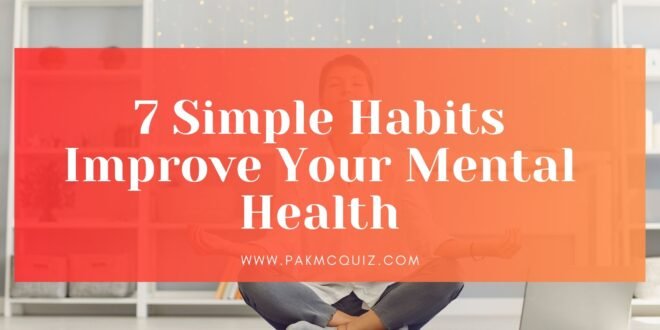In today’s fast-paced world, taking care of your mental health is just as important as maintaining your physical health. Stress, anxiety, and burnout are becoming increasingly common, but the good news is that small, consistent habits can make a big difference. In this blog, we’ll explore 7 simple habits to improve your mental health that you can start today. These tips are easy to implement, highly effective, and backed by science. Whether you’re dealing with daily stress or just want to feel more balanced, these habits will help you thrive.
Table of Contents
Why Mental Health Matters
Mental health affects every aspect of your life—from your relationships and work performance to your physical health and overall happiness. By prioritizing your mental well-being, you can improve your quality of life, build resilience, and better handle life’s challenges. The best part? You don’t need to make drastic changes to see results. Small, daily habits can have a profound impact over time.
7 Simple Habits to Improve Your Mental Health
1. Practice Gratitude Daily
Gratitude is a powerful tool for improving mental health. Taking a few minutes each day to reflect on what you’re thankful for can shift your focus from what’s wrong to what’s right. Try keeping a gratitude journal and write down 3 things you’re grateful for every day. Over time, this practice can boost your mood and reduce stress.
2. Move Your Body
Exercise isn’t just good for your physical health—it’s a natural mood booster. Physical activity releases endorphins, which are chemicals in your brain that make you feel happy. You don’t need to run a marathon; even a 20-minute walk, yoga session, or dance break can make a difference.
3. Connect with Others
Human connection is essential for mental well-being. Make time to connect with friends, family, or loved ones, even if it’s just a quick phone call or text. If you’re feeling isolated, consider joining a club, volunteering, or participating in community events to build new relationships.
4. Prioritize Sleep
Sleep and mental health are closely linked. Poor sleep can worsen stress, anxiety, and depression, while good sleep can improve your mood and cognitive function. Aim for 7-9 hours of quality sleep each night by creating a relaxing bedtime routine and avoiding screens before bed.
5. Limit Screen Time
While technology has its benefits, excessive screen time can negatively impact your mental health. Set boundaries by taking regular breaks from your devices, especially social media. Try implementing a “no screens” rule during meals or before bed to give your mind a break.
6. Practice Mindfulness
Mindfulness is the practice of being fully present in the moment. It can help reduce stress, improve focus, and enhance emotional regulation. Start with just 5-10 minutes of mindfulness meditation each day. Apps like Headspace or Calm can guide you if you’re new to the practice.
7. Do Something You Enjoy
Make time for activities that bring you joy, whether it’s reading, painting, gardening, or playing a musical instrument. Engaging in hobbies can reduce stress, boost creativity, and provide a sense of accomplishment.
Bonus Tips for Better Mental Health
- Eat a Balanced Diet: What you eat affects your brain. Focus on whole foods like fruits, vegetables, lean proteins, and healthy fats to support your mental health.
- Set Realistic Goals: Break big tasks into smaller, manageable steps to avoid feeling overwhelmed.
- Seek Professional Help: If you’re struggling, don’t hesitate to reach out to a therapist or counselor. There’s no shame in asking for help.
Real-Life Success Stories Improve Your Mental Health
Emma’s Journey: Finding Calm Through Mindfulness
Emma, a marketing manager, used to feel overwhelmed by her busy schedule. After incorporating mindfulness meditation into her daily routine, she noticed a significant reduction in her stress levels. “I feel more focused and in control,” she says. “It’s like I’ve found a reset button for my mind.”
James’ Story: Building Connections
James, a college student, struggled with loneliness during the pandemic. By joining a local book club and reconnecting with old friends, he felt a renewed sense of belonging. “Having people to talk to has made all the difference,” he shares.
FAQs About Improving Mental Health
Q: How long does it take to see results?
A: Some habits, like gratitude and mindfulness, can provide immediate relief, while others, like exercise and sleep, may take a few weeks to show noticeable improvements. Consistency is key.
Q: Can I combine these habits?
A: Absolutely! Combining habits like exercise, mindfulness, and gratitude can create a powerful synergy for better mental health.
Q: What if I don’t have time for these habits?
A: Start small. Even 5-10 minutes a day can make a difference. Over time, you can gradually increase the time you dedicate to these practices.
Professional Opinion
Improving your mental health doesn’t have to be complicated or time-consuming. By incorporating these 7 simple habits into your daily routine, you can reduce stress, boost your mood, and build resilience. Remember, small changes can lead to big results over time.
Start today by choosing one or two habits to focus on. Your mind—and your future self—will thank you! Read more about Benefits of Black Seed




